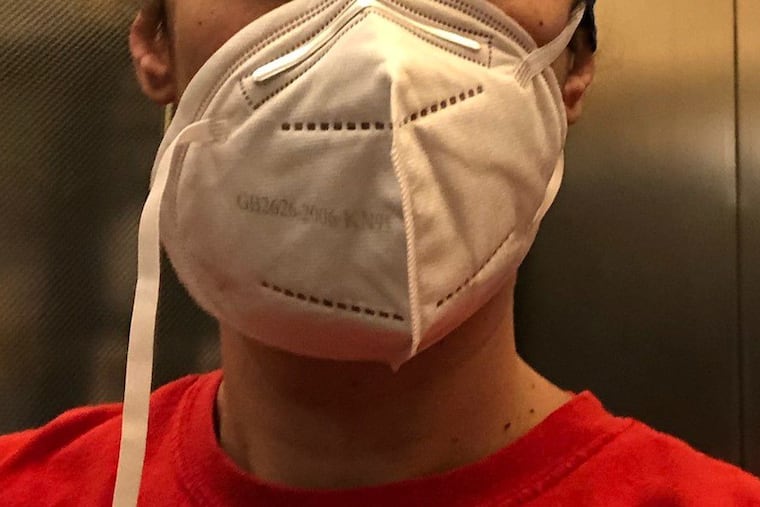Temple hospital workers say Chinese masks meant to protect against COVID-19 are falling apart
The national shortage in protective gear for medical workers has health facilities scrambling to make up the shortfall, sometimes encountering sub-optimal products.

The Chinese-made protective masks Temple University Hospital workers use while treating COVID-19 patients are splitting along the seams, sprouting holes, and breaking along the elastic bands that hold the lifesaving equipment onto doctors’ and nurses’ faces.
Some medical staff are bringing their own masks to work; others are doubling up masks, or tying surgical masks in front of their KN95 masks. Nearly 200 workers in the Temple University Health System have tested positive for the virus, according to a union representing nurses and other clinical workers, and 58 of them work at the hospital on North Broad Street.
“When you’re in front of a patient and the mask falls off your face, what are you going to do, cover your face with your elbow?" said Celeste Bevans, a radiology technician and a representative of the Temple University Allied Health Professionals union.
Each medical worker is typically issued a new KN95 daily, Bevans said, and with even one day of use the workers have reported equipment failures.
The masks get their names from the fact that if properly fitted, they should filter 95% of particles the size of the coronavirus.
Just last week, the U.S. Food and Drug Administration listed as unsuitable dozens of brands of Chinese mask imports that had been authorized under an emergency order, though they did not get the usual vetting process.
» READ MORE: Philly ordered a half-million masks to protect first responders and hospitals from coronavirus. They never arrived.
The KN95 masks used by Temple, which staff members say are manufactured by Trust Loyalty & Glory Epoch Network Technology Co. of Suzhou City, China, “meet FDA guidelines and CDC recommendations,” said Jeremy Walter, a spokesperson for Temple hospital.
“We will continue to monitor the situation and respond appropriately,” he said, but did not respond to questions seeking more specifics.
The Centers for Disease Control and Prevention tested 10 of the manufacturer’s masks on Thursday, and found all had a filter efficiency of 98.29% or better, above the standard required of N95 masks. The CDC report, though, noted that the masks are held in place with ear loops rather than headbands, which secure N95 masks. Using ear loops can cause difficulties in obtaining a proper fit, the report states, necessary to ensure the best protection against viral particles.
Medical staff who complain they cannot get the masks to fit properly are told by administrators that "we’re using them wrong,” Bevans said.
Trust Loyalty & Glory Epoch is registered as a mask importer with the FDA, but that is no guarantee of quality.
“That registration in the context of a COVID health emergency ... doesn’t mean very much,” said Anne Miller, head of supplier vetting for ProjectN95, a nonprofit that seeks to validate the quality of protective gear in the wake of the crisis.
“I feel some compassion for that hospital,” she said of Temple, “because I really don’t think they’re trying to give their health-care workers bad product.”
On April 3, the FDA responded to the shortage of medical protective gear with an Emergency Use Authorization order that listed almost 90 Chinese mask manufacturers as suppliers for N95-quality masks. The manufacturers documented that the masks met N95 mask standards through testing in an independent lab.
Some masks that had passed overseas testing and won authorization flunked testing by the U.S. Centers for Disease Control and Prevention in recent weeks, according to the New York Times.
The test results prompted the FDA to withdraw from its authorized list 65 manufacturers who used tests from overseas labs as proof of quality, the agency said. The FDA no longer authorizes masks submitted with overseas lab results.
Trust Loyalty & Glory Epoch products, though registered with the FDA, were not among the authorized manufacturers, so it was not one of the manufacturers removed from the FDA’s authorized list Thursday.
The company’s U.S. agent, Sungo Technical Service Inc. of Chicago, did not reply to requests for comment. The Trust Loyalty website says it has been manufacturing KN95 masks since 2015.
The company’s masks were tested in a Chinese laboratory, according to the website, and reported a particle filtration efficiency better than or equal to 95%.
Across town from Temple, Main Line Health System bought 150,000 masks from another Chinese manufacturer on March 23. That company was among those banned by the FDA Thursday. Few of the masks had been used.
“The inability to get basic PPE would have never been a concern in the past,” said Chris Torres, a Main Line vice president. “Now it will forever change how we look at our supply chain going forward.”
Front-line nurses in the University of Pennsylvania Health System said they have been issued masks from 3M Co., the same company the hospitals used before the coronavirus pandemic. A spokesperson for Einstein Health System, which along with Temple has seen a disproportionate share of virus patients, said it had not purchased masks from the FDA list.
» HELP US REPORT: Are you a health care worker, medical provider, government worker, patient, frontline worker or other expert? We want to hear from you.
At Temple, administrators initially provided worried workers with documentation that the masks complied with 1993 and 2007 European Union directives. Since then, workers have been told that discussing the mask issue again would be repetitive, Bevans said.
“I think people have lost the faith that this is going to be fixed,” she said.